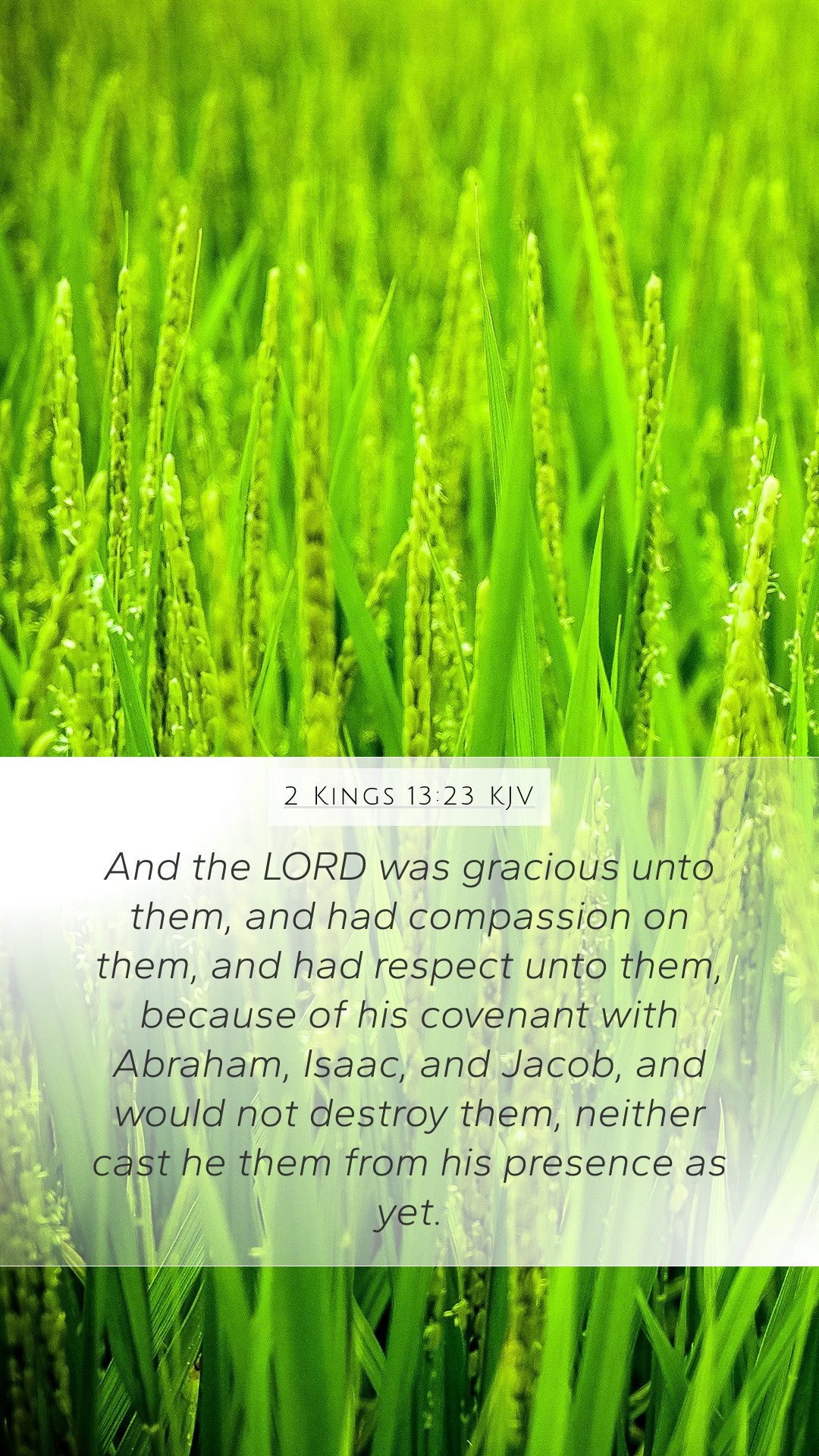Understanding 2 Kings 13:23: A Biblical Commentary
Verse Overview:
2 Kings 13:23 states, "But the Lord was gracious to them and had compassion on them and turned toward them, because of His covenant with Abraham, Isaac, and Jacob, and would not destroy them or cast them from His presence until now." This verse highlights crucial themes of mercy, covenant, and divine compassion.
Contextual Background
The context of 2 Kings 13 involves the decline of Israel amidst the backdrop of persistent idolatry and sin. The nation faced various oppressions, particularly from the Arameans. Here, we see a significant shift from judgment to mercy, which is pivotal for understanding God’s character as revealed throughout Scripture.
Insights from Public Domain Commentaries
Matthew Henry's Commentary
Matthew Henry emphasizes that God’s compassion is rooted in His covenant promises. Despite Israel's failures, God remains faithful to His word, showcasing that His mercy transcends human disobedience. Henry notes that the remnant of faithful people significantly influences God's posture towards an unfaithful nation. His commentary invites readers to reflect on God's unfailing love and grace.
Albert Barnes' Notes on the Bible
Albert Barnes outlines the essential nature of the covenant as a means through which God’s steadfast love is applied to a wayward people. He points out that God’s compassion leads Him to act not solely based on the nation’s current state but on His promises to the patriarchs. This acknowledges a broader theological narrative concerning Israel's identity and purpose in redemptive history. Barnes interprets the reference to the covenant as an anchor for understanding Israel's endurance despite adversities.
Adam Clarke's Commentary
Adam Clarke focuses on the historical aspect of this verse, discussing how God's mercy extended even to those who had gone astray. He notes that the mention of the patriarchal covenant illustrates God's long-suffering nature and His commitment to Israel. Clarke offers insights into the faithfulness of God throughout generations, highlighting that divine compassion often prevails over judgment. Clarke encourages his readers to recognize the significance of repentance and the importance of recognizing God's grace.
Thematic Elements
1. Divine Compassion: The verse portrays God as compassionate, emphasizing His readiness to extend mercy to individuals and nations, even in times of waywardness.
2. Covenant Faithfulness: The concept of covenant is central; God's promise to Abraham, Isaac, and Jacob serves as the enduring basis for His relationship with Israel.
3. Remnant Theology: The idea that a faithful remnant can influence God’s mercy toward a nation can inspire discussions within Bible study groups about the roles of faith and intercession.
Application for Today
This verse encourages contemporary readers to reflect on the reliability of God's promises and the importance of compassion in their lives. Understanding this passage can be pivotal for those involved in Bible study groups, prompting discussions on themes of mercy and grace as applicable to modern contexts.
Practical Insights:
- Encouragement in Trials: Much like the Israelites endured oppression, believers can take heart knowing that God remembers His promises during personal trials.
- Inspiration for Intercession: The faithful remnant can inspire leaders today to pray for their nations, advocating for repentance and divine mercy.
- Understanding God's Character: Knowledge of God's compassionate nature urges believers to embody compassion in their interactions.
Related Scripture References
- Exodus 34:6-7: Discusses God's attributes of compassion and mercy.
- Deuteronomy 7:9: Emphasizes the covenant faithfulness of God.
- Psalm 103:8: Celebrates the merciful and gracious nature of God.
- Isaiah 54:10: Affirms that God’s covenant of peace remains despite circumstances.
- Romans 11:1-2: Paul discusses God’s continuing faithfulness towards Israel.
Conclusion
2 Kings 13:23 serves as a profound reminder of God's unchanging character – that in the face of disobedience and turmoil, He remains a God of mercy through His covenants. This understanding allows us to engage deeply in Bible verse explanations and Bible study insights, enriching our grasp of God’s grace throughout Scripture.


